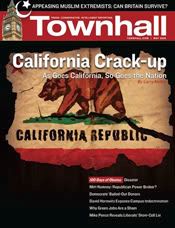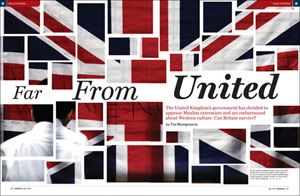 |
| Subscribe Today |
When soldiers from Britain’s Royal Anglians recently returned from a tour of duty in Iraq, they were given a homecoming parade by the southern English town of Luton. The vast majority of the local people greeted the troops with cheers, smiles and flowers. But a day of thanksgiving was overshadowed by the loud protests of a group of Islamic extremists. Holding up placards, they accused Britain’s heroic soldiers of being “butchers,” “war criminals,” “murderers” and “baby killers.” By granting the Muslim protestors a right to insult the soldiers, the police were risking a breach of the peace—and a breach of the peace did occur. But Britain’s police service always appears eager to bend over backwards for a militant minority within the Muslim population.
If the British state is ready to give the Muslim community the benefit of the doubt when it comes to free speech, it is just as ready to surrender the same principle when Muslim leaders demand. Prime Minister Gordon Brown’s government banned Dutch parliamentarian Geert Wilders from entering Britain in February. The ban followed threats from Islamic Web sites to mobilize a protest mob if Wilders wasgranted the right to deliver his warning that Islam is an intrinsically violent religion.
The ban on Wilders contrasts with the treatment of spokesmen for Islamic terror. Douglas Murray of the London based Centre for Social Cohesion has documented the numerous extremist clerics that enter Britain every year. These extremists, he writes, “remain happily untroubled by our authorities despite being filmed calling for the murders of Jews, homosexuals, Hindus, Muslim apostates and others.” Murray continues: “This country hosts many ambassadors—official and unofficial— from terrorist organizations such as Hamas and Hezbollah who call for the annihilation of whole peoples.”
‘LONDONISTAN’
The large number of extremists living in Britain’s capital city—undisturbed by Britain’s authorities—was the subject of Melanie Phillips’ 2006 book, “Londonistan.” She argued that the British authorities had an unwritten agreement that they would turn a blind eye to extremists gathering and plotting in London as long as Britain was, herself, spared violence. That unwritten—and sickening—appeasement should have come to an end July 7, 2005, when more than 50 Londoners were killed by homegrown suicide bombers. Alas, it has not.
Instead, Britain’s reaction to 7/7 has been more appeasement. Huge sums of money have been allocated to what is described as “the prevention of extremism,” but the British state is repeating the mistakes it made in Northern Ireland.

In attempting to end the terrorism of Northern Ireland, the British state treated most extensively with the most extreme voices of Irish nationalism. Sinn Fein—the political arm of the Irish Republican Army terrorists—won a lion’s share of the government’s attention. The moderate Social Democratic and Labour Party (SDLP)—which had long championed mainstream and majority nationalist opinion—was sidelined. Canny nationalist activists observed this and joined the political movement—Sinn Fein—that was clearly holding the bulk of the bargaining chips. The SDLP— and moderate nationalism—withered as a result.
BRITAIN’S MUSLIM POPULATION BOOM
Britain is a nation that lives in fear of its fast-growing Muslim population. The number of British Muslims was about 1.6 million in 2001 (in a total population of 60 million). By 2004, that population had grown to 1.9 million. By 2008, the Labour Force Survey suggests a Muslim population of more than 2.4 million. Through immigration, a disproportionately high birth rate and religious conversion, the Muslim population is increasing 10 times faster than the rest of the population. But the numbers alone do not tell the most important part of the story. The growing Muslim population is young, concentrated in London—and militant.
The concentration in London is particularly important. London dominates British life in a way that is not true of any equivalent American or European city. Financial, political and cultural powers are all concentrated in London, and Muslims now make up an estimated 1-in-12 of London’s citizens. The proportionate influence is even greater when the dominance of young Muslims is counted. Head teachers of state-funded schools are under enormous pressure from Muslim parents to put their religious beliefs at the heart of the curriculum. Unlike in America, this is legally permissible.

BRITAIN’S LEFT AND RADICAL ISLAM: UNITED IN ANTI-AMERICANISM
More than any other national politician, former Mayor of London Ken Livingstone understood the power of the Muslim vote. During his early political career, in the 1970s and 1980s, Livingstone became famous for championing gay rights, feminism and other left-wing causes. His journey since then is typical of many thought leaders of the Left. Livingstone has been prepared to compromise on those progressive beliefs in order to court Muslim voters. His willingness to do this has certainly been motivated by the number of Muslim voters in London but also significant has been the anti-Americanism and hostility to Israel of many British Muslims.
The extent to which anti-Americanism has perverted Britain’s Left has been documented by Nick Cohen in his landmark book, “What’s Left.” Michael Gove, the leading Conservative member of Parliament, also wrote about the phenomenon in his anti-Michael Moore book, “Celsius 7/7.” “The Left’s victims and heroes are no longer proletarians but guerrilla fighters in the developing world,” wrote Gove. “The Left’s enemies are no longer primarily a system, capitalism and its agents, such as big business. Instead the principal enemy is now the oppressive West and, in particular, the Great Satan, America, and the Little Satan, Israel. The Crusaders and the Zionists.” He concludes: “Antipathy towards America, like opposition to Israel, has become the touchstone of radical Left credibility.”
Livingstone has been in the vanguard of this evolution of the Left. The most powerful expression of Livingstone’s alliance with the forces of anti- American/Islamic extremism was his willingness to use taxpayers’ money to bring Yusuf al-Qaradawi to London. According to one of Britain’s most prominent human rights campaigners, Peter Tatchell, the cleric al-Qaradawi supports “female genital mutilation, wife beating, the execution of homosexuals in Islamic states, the destruction of the Jewish people, the use of suicide bombs against innocent civilians and the blaming of rape victims who do not dress with sufficient modesty.
THE CHURCH OF ENGLAND IN RETREAT
Livingstone is not alone in appeasing radical Muslim opinion. The opposition Conservative Party declined to protest against the ban on Geert Wilders for fear of alienating Muslim voters. Most disappointing of all has been the position of the Church of England. The leader of the Anglican Church, Archbishop Dr. Rowan Williams, has spoken positively about the introduction of aspects of Shariah law in Britain.
A caucus of evangelical members of the church had to fight very hard to force their bishops to accept that they still have a duty to convert Muslims to Christianity. The bishop in charge of the Church’s urban ministry, Stephen Lowe, had resisted these efforts. He said that the Church should focus on building relationships with Muslims rather than “spreading the Word.” Fortunately the evangelical members won the vote in the Synod—the Church’s ruling body—but few hold great expectations that the bishops will abandon their efforts to accommodate Islamic opinion.
IMPLICATIONS FOR BRITISH FOREIGN POLICY
A militant Muslim population has significant implications for British foreign policy: 80 percent of Britain’s Muslims opposed both the Iraq and Afghanistan wars. Muslim voters— traditionally loyal to the Labour Party— unseated pro-Iraq War Labour members of Parliament at the 2005 general election in favor of a multitude of antiwar candidates.
None of Britain’s three major political parties has seemed able to make the case that British soldiers are dying in Iraq and Afghanistan in large part for the sake of Muslim people and their freedoms. Each of the parties is now hesitant on foreign policy. No senior British politician backed the successful surge of troops in Iraq. Afraid of domestic Muslim opinion—and wider hostility to the war amongst the British people—there is particular anxiety about Pakistan. Many British Muslims originate from Pakistan. Flights from Heathrow to Pakistan are hugely popular. There is a great fear that any collapse in Pakistan will have major implications for community relations in Britain.
Appeasement, the dominant theme of British policy towards its Muslim population to date, has failed not only to repair Britain’s fractures but has served to further exacerbate cultural rifts. There are two other strands of response: (1) Formalization and (2) Reformed Integration.
‘FORMALIZING’ BRITISH MUSLIMS
Under “Formalization,” the British state has been attempting to bring Muslims into the fold of the state. The theory is that Muslim schools and other organizations are radicalized when they are unregulated and dependent upon money from Saudi Arabia and other states. The British state is attempting to detach Muslim organizations from Wahhabi and other imported cash from overseas extremists by supplying them with British taxpayers’ money.
There is certainly a lot of evidence that Britain’s Muslims have been radicalized. An opinion survey found that 31 percent of British Muslims believe that Western society is decadent and immoral and should be brought down by “peaceful means”; nearly a quarter sympathized with the “feelings and motives” of the 7/7 London Underground bombers; 40 percent wish to see Shariah law implemented in Britain; and 45 percent think that Muslim preachers who advocate violence against the West are in touch with mainstream Muslim opinion.

But in awarding cash grants to “Muslim community groups,” the British state makes a false distinction between non-violent extremists and violent extremists. This false distinction was explored in a recent paper produced by Dean Godson at London’s Policy Exchange think tank. The report, “Choosing Our Friends Wisely,” records how £90 million of U.K. taxpayers’ money has resulted in “non-violent extremists [becoming] well dug in as partners of national and local government and the police.” The report continues: “Some of the government’s chosen collaborators in ‘addressing grievances’ of angry young Muslims are themselves at the forefront of stoking those grievances against British foreign policy; Western social values; and alleged state-sanctioned ‘Islamophobia.’ … [Government money] is thus underwriting the very Islamist ideology which spawns an illiberal, intolerant and anti-Western worldview. Political and theological extremists, acting with the authority conferred by official recognition, are indoctrinating young people with an ideology of hostility to Western values.”
British Conservative MP Paul Goodman has repeatedly questioned the government about which groups are receiving the “Preventing Violent Extremism” grants but long delays in government reporting procedures mean that there is little accountability.
“Formalization” has also run into difficulties in education. Since coming to power in 1997, the Labour governments of Tony Blair and Gordon Brown have sought to establish a large number of state-funded Muslim schools. One of the aims has been to ensure the children of Muslim parents are educated in schools that are inspected by the British government and not in schools that receive significant donations of money and books from Saudi and other sources.
This is a fine idea in principle, but the official Schools Inspectorate (Ofsted) has worried that the schools are still failing to integrate pupils into wider British society. Ofsted also lacks the skills to be able to properly inspect the religious materials used in many of these schools. There is concern that these materials— written in many languages—may contain radicalizing messages.
AN UNCERTAIN BRITAIN WILL NOT ENCOURAGE INTEGRATION
If “Formalization” is failing, some believe that “Reformed Integration” is the only way forward. A crude form of integration probably wouldn’t work. Younger Muslims are rejecting Britain for a variety of reasons. And self-loathing characterizes much of the London establishment’s attitude to Britain’s history, its once-cherished values and its institutions.
The Justice affairs spokesman of Britain’s opposition Conservative Party, Dominic Grieve, has expressed particular concern at “the dumbing down of history.” Delivering a lecture on multiculturalism, he expressed his worries, saying, “Instead of children being taught to have respect for past events and individuals who have shaped their lives, they are encouraged to be contemptuous of people who did not live up, in their own era, to the then unknown values of modern Britain. I am convinced that this approach has hindered more recent immigrants to this country developing a sense of belonging.”

Grieve also argues that Britain needs to do much more to stop the import of foreign customs that do not fit with British traditions. He has promised that an incoming Conservative government will target discriminatory practices against women—including tolerance of polygamy—and corrupt political and electoral practices. He fears these practices have been tolerated by too many “do-gooders” who are more worried about avoiding offense and accusations of racism than defending traditional cultural norms.
A Britain unloved by its own leaders is not going to succeed in attracting the loyalty of younger Muslims who are actively being seduced by more self-confident belief systems. The ideology instigated by the Muslim Brotherhood and developed since by many radical offshoots is sweeping parts of Britain—much to the concern of Britain’s first generation of Muslim immigrants. Nearly half of British young people now attend university and Islamist organizations are very active on campuses—as they are in prisons and at inner city mosques.
The vast majority of Britain’s Muslims are law-abiding people. They love Britain and came to live within its borders because of its values and history. A policy of “Reformed Integration” is the best hope that their children will be saved from the radical groups that prey upon them and that—quite unbelievably—are being subsidized and lauded by the British state. It is particularly important that new groups are formed to represent mosques and mainstream Muslim citizens. Some of the groups that purport to speak on behalf of Muslims such as the Muslim Council of Britain (MCB) are not representative. The MCB’s annual boycott of Holocaust Memorial Day says everything anyone needs to know about the ideology of this group.
Michael Gove and a passage from his “Celsius 7/7” book captures the challenge facing Britain: “Unless we retain the moral clarity to know that Western society, its freedoms and traditions, are worth celebrating, deserve to be emulated, and will benefit others by being adopted, then we will find them increasingly difficult to defend at a time of trial.”


























Join the conversation as a VIP Member